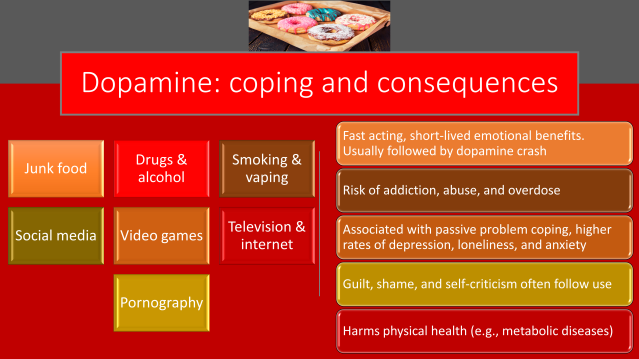DOPAMINE- Are You a Dopamine-Coper or a Serotonin-Coper? How you cope with problems determines your health and quality of life. Reviewed by Michelle Quirk

KEY POINTS-
- While problems are universal, coping styles vary.
- Dopamine-coping works quickly, but only briefly, and has adverse long-term consequences.
- Serotonin-coping works slowly but has long-lasting effects and long-term benefits.
Even without lengthy questionnaires or clinical interviews, mental health professionals can make remarkably good predictions about a person's quality of life by knowing just one thing: how the person characteristically copes with their problems.
Problems are a price we pay for living. They are a tax on existence for which there are no loopholes and from which no one is exempt. For example, even the healthiest people experience health problems. Even the wealthiest people suffer financial problems. Even the most loving couples and families have relationship problems. Problems may vary in their form, their frequency, and their intensity. But everyone is otherwise either managing problems they already have or headed toward new problems. As long as we live, those are the only two options we have.

If this omnipresent description of problems sounds grim, there is good news. It turns out that humans are exceptional problem solvers. In fact, it is fair to estimate that we're the best problem solvers in the known universe. The vast history of human civilization can be summarized as follows: a process of progressive problem-solving. Modern humans are simply Stone Age humans who've had a hundred thousand years to learn how to solve ever bigger and more complex problems of living.
Problem-Solving in Modernity
The marvelous advancements of modernity haven't freed us from problems, but they have given us more problem-solving options. We now enjoy, for example, resources such as instructional videos on YouTube, Google searches, and even generative AI to help us solve problems. These resources would have seemed nothing short of miraculous just a few decades ago.

However, the staggering advancements of modernity have also introduced pitfalls when it comes to problem-solving. We now possess, for example, many more ways to procrastinate, rationalize, distract ourselves from, and numb ourselves to the problems of living than ever before (see above figure). Neuroscientists sometimes refer to the above as "dopamine-coping" due to the underlying reliance each of these coping and problem-solving behaviors have on the neurotransmitter dopamine.1
As a problem-solving tool, dopamine-coping "works." We usually feel better, but the benefits are brief and the original problem remains (if not worsens). Further, dopamine-coping seduces us into avoiding the more difficult and time-consuming steps necessary to solve problems more effectively (consider that a "problem" may be as mundane as a feeling of anxiety or boredom—it need not be a major illness or home foreclosure—that one wishes to "solve" by making it go away).

On the other hand (see above figure), most of the mental health and even self-help industries are aligned in promoting a different kind of problem-solving called "serotonin-coping." Serotonin-coping consists of problem-solving behaviors that increase the neurotransmitter serotonin.2 Like dopamine-coping, behaviors that increase serotonin also make us feel better. However, while serotonin's emotional benefits work more slowly than dopamine's, they last longer. Serotonin-coping also has the considerable upside of promoting effective problem-solving states. Want to be confident, creative, and courageous in facing your demons and overcoming your problems? If so, serotonin is your secret weapon.
Do you think it is a coincidence that all evidence-based psychotherapies focus on behavioral treatments that increase serotonin? Or that the most effective antidepressants such as Prozac work by upregulating serotonin availability in the brain? Modern life increasingly sells and promotes dopamine-coping while the common goal across modern mental health treatments is helping people escape these patterns.
Summary
The quality of your life is in direct proportion to your ability to solve problems. This means the stakes are high and you need to bring the best strategies you have to the game. Whether you are managing emotional stress, financial worries, relationship problems, career struggles, or the pains of aging, serotonin-coping strategies are likely the most powerful resources you have in pursuit of your best life.
- Questions and Answers
- Opinion
- Motivational and Inspiring Story
- Technology
- Live and Let live
- Focus
- Geopolitics
- Military-Arms/Equipment
- Security
- Economy
- Beasts of Nations
- Machine Tools-The “Mother Industry”
- Art
- Causes
- Crafts
- Dance
- Drinks
- Film/Movie
- Fitness
- Food
- Games
- Gardening
- Health
- Home
- Literature
- Music
- Networking
- Other
- Party
- Religion
- Shopping
- Sports
- Theater
- Health and Wellness
- News
- Culture

